UC Davis marks Gary S. May’s fifth anniversary as chancellor this week by highlighting the university’s advances under his leadership, challenges he has dealt with, and what he sees for UC Davis in the next five years.
The Board of Regents confirmed May’s appointment Feb. 23, 2017, plucking him from the dean’s office of the Georgia Tech College of Engineering. Before taking office, he visited the campus for “Pack the Patio,” outside the Memorial Union, where hundreds of faculty, staff and students eager for the transition in leadership came out to greet him.
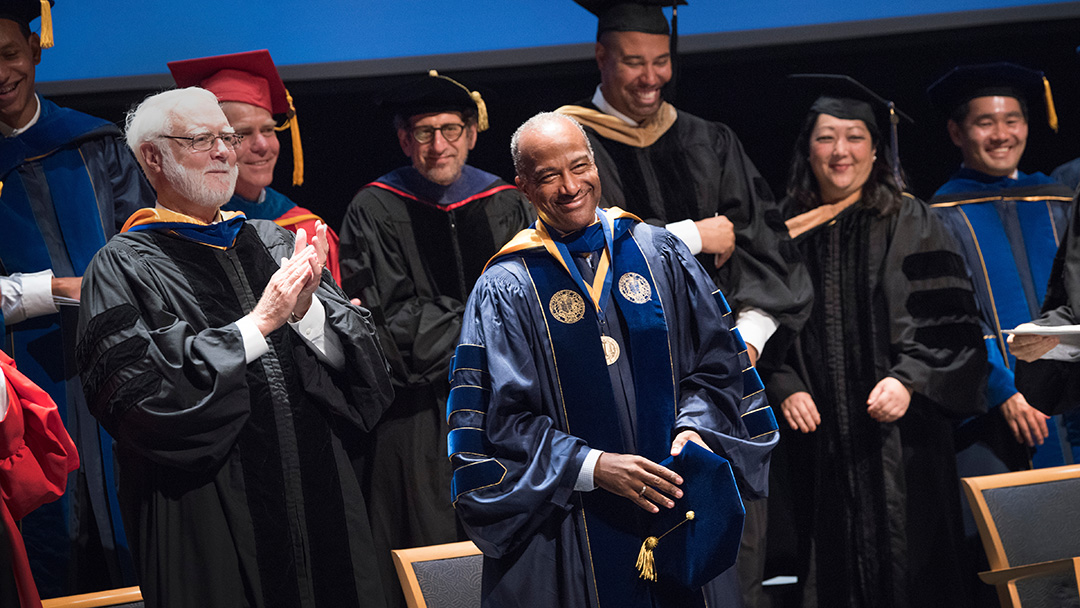
He also attended Black Convocation during that visit, giving a hint of his leadership style, one that includes participating in campus events almost every day and night of the week.
Then, in late July 2017, he arrived for good as UC Davis’ seventh chancellor, unpacking in his new office in Mrak Hall a day before his official first day. He chose “Future Forward” as the theme of his first fall welcome, and he’s been looking forward ever since.
“The way I live my life is that I try every day to learn something, to help someone and to make the world better. I encourage others to do the same.”
— Chancellor Gary S. May
UC President Emerita Janet Napolitano, who had recommended May’s appointment, would tell him four years later, while participating in one of his Chancellor’s Colloquia, “I think you may be one of my best hires ever.”
To which the chancellor responded, in his often-self-effacing style, “Oh, very kind of you. Please repeat that at dinner when my wife is present.”
Napolitano is not alone in her praise. Sacramento Mayor Darrell Steinberg, who works closely with Chancellor May on the Aggie Square development, said: “He was the right person at the right time to lead a new partnership between the city and UC Davis. In just a short time, this collaboration has already yielded great results, with us breaking ground earlier this year on Aggie Square, a transformative project that is equal parts research, innovation, and opportunity for our residents and neighborhoods.”
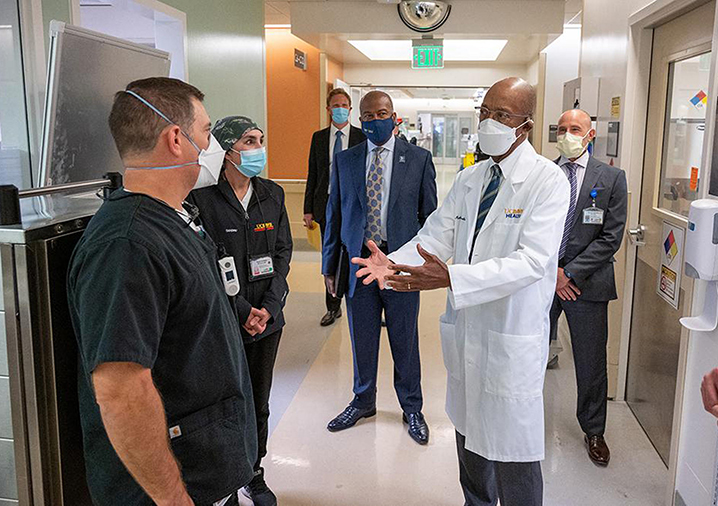
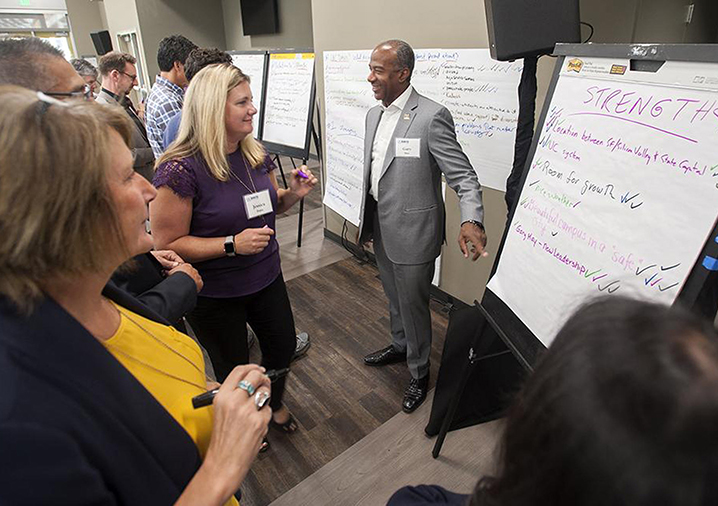
‘To Boldly Go’
From the outset, Chancellor May let everyone know he would be a bold leader, as reflected in the strategic plan he titled “To Boldly Go” even before it was written, borrowing a phrase from Star Trek (a favorite of his in the science fiction realm). He launched the plan’s development in his third month in office, and the whole process — including broad community input — was completed in less than a year, giving the campus an early indication of the new chancellor’s work pace.
“To Boldly Go” outlines a 10-year vision with five goals:
- Educational experience, preparing all students to address the needs and challenges of a changing world.
- Enable and support research at the frontiers of knowledge, in support of a healthy planet and the physical and societal well-being of its inhabitants.
- Embrace diversity, practice inclusive excellence and strive for equity.
- Support our community, region, state, nation and world through mutually beneficial and impactful partnerships.
- Create an intellectual and physical environment that supports the development of an innovative and entrepreneurial culture.
While shepherding his vision, he has also exerted leadership beyond the campus. In October 2017, shortly after taking office, he spoke in Washington, D.C., in support of “Dreamers” and legislation under which they could stay in the United States to continue their education and contribute to society without fear of deportation. The previous month, then-President Donald Trump threw their status into jeopardy with an executive order stating his intent to rescind Deferred Action Against Childhood Arrivals, or DACA — an order eventually overturned by the Supreme Court in a lawsuit brought by the University of California.
He addressed the same subject in his first fall welcome address, saying: “At UC Davis, we open our doors to the world and give the best and brightest a chance to shine, no matter where they happened to be born. Abandoning DACA ... runs counter to our principles of open and equal access to higher education for students of all backgrounds.”
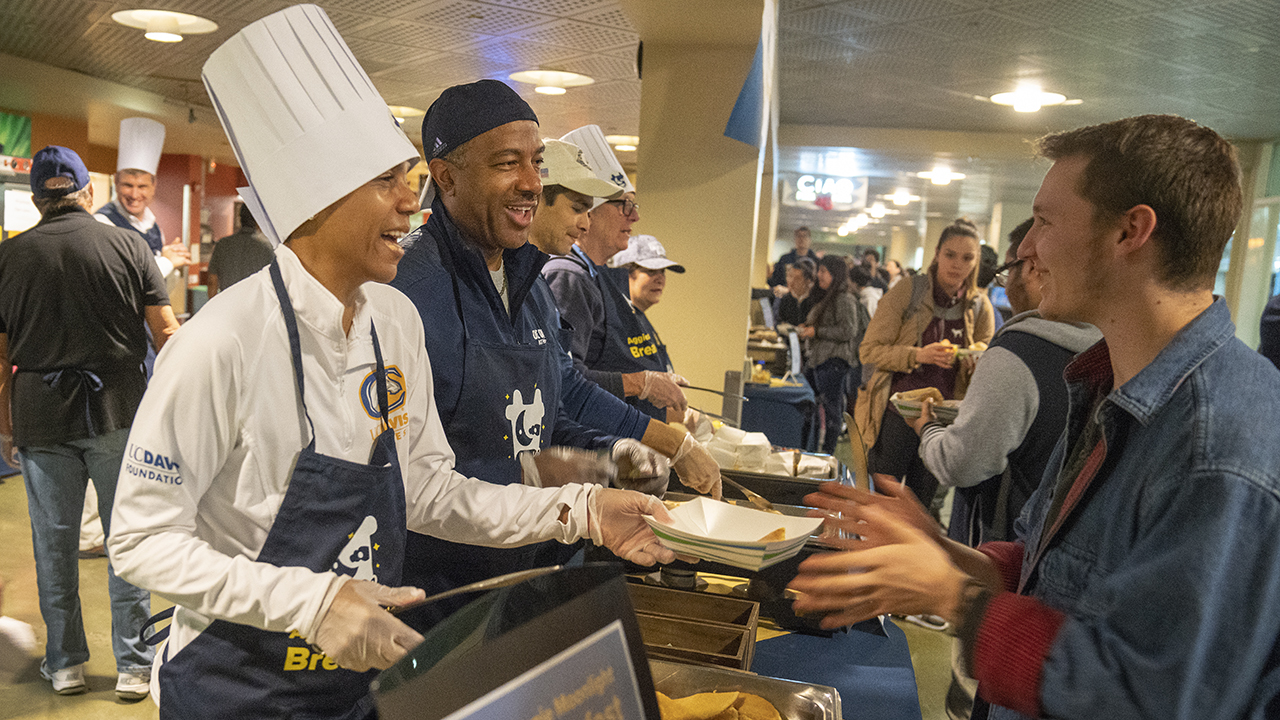
‘Papa’ May on the job
He connects regularly with students representing a wide variety of interest groups, from the ASUCD to his Undergraduate Advisory Board to athletics, or no interest group at all. He’s been to see the Black Panther with students and, during finals, he feeds a hungry student body at Moonlight Breakfast. Besides pancakes and eggs, the menu includes a plate full of selfies with the chancellor.
He started the Leadership Job Shadow Program whereby students have a one-on-one day with the chancellor or other leaders, accompanying them in their meetings and other work.
His student-focused approach (and social media presence) has gained him a nickname among students — “Papa” May. His wife, LeShelle, joins him in having good rapport with students. They host a weekly video program called Thursday Thoughts on Instagram, answering questions about COVID-19 and other issues of the day, and, of course, sharing their thoughts on a range of topics, from favorite music and movies, to how to prepare for finals.
Chancellor May set the wheels in motion for the Aggie Compass Basic Needs Center, a one-stop, centrally located resource for students, providing food (in partnership with the ASUCD Pantry and other sources) and assistance with mental health and housing issues.
He dealt with major crises that interrupted education on campus — first, wildfire smoke in 2018, then the pandemic that began in March 2020. He became a recognized voice across the nation with his statements on social justice issues, including an op-ed titled “George Floyd Could Have Been Me.”
He joined with Chief Joe Farrow in campus safety reforms like the CORE officer program whereby nonuniformed personnel provide a new way for the community to interact with police.
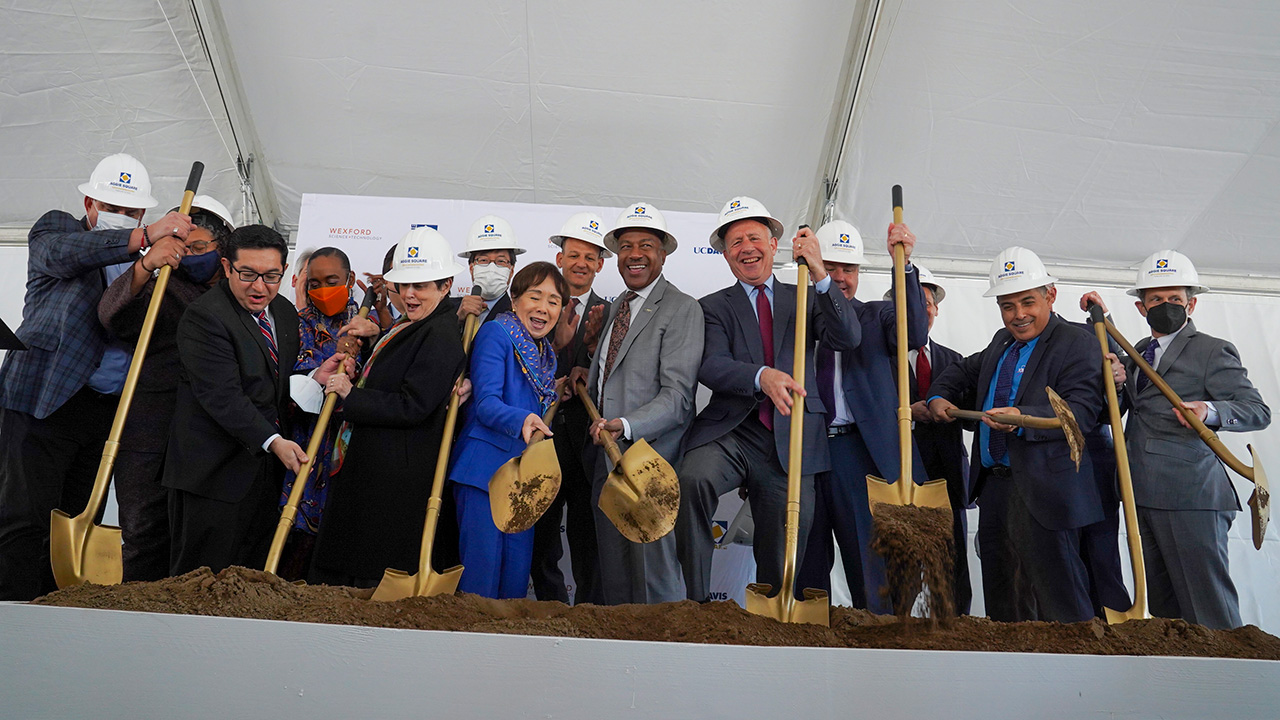
Through it all, he persevered with other major initiatives, most notably Aggie Square — a workspace for innovation and community engagement, not to mention an estimated economic impact of nearly $5 billion a year in the Sacramento region. He began working on Aggie Square even before taking office, collaborating with Mayor Steinberg and others to put all the pieces together, such as work opportunities and housing assistance for nearby residents.
The ceremonial groundbreaking took place in February 2022, and construction is underway on the fenced-off site. It’s on the Sacramento campus but involves all of UC Davis, indicative of a new synergy between the Davis and Sacramento campuses.
The Quarter at Aggie Square program, for example, is already up and running, for undergraduates in cohorts focusing on such topics as transformative justice; biomedical engineering, health care politics and policy; and immigrants, refugees and human rights. Each “experience,” as they are called, comprises several courses, an internship or research, and community engagement. And, when Aggie Square is built, many students will live there.
‘Intolerance will not win’
Within just a few weeks of taking office, Chancellor May found himself in Davis’ Central Park speaking at a Unity Rally in the wake of a woman’s tragic death in Charlottesville, Virginia, run down by a car as she took part in a counterprotest to the white nationalists who had come to the home of the University of Virginia to spew their hate. The driver was later convicted of first-degree murder.
“I have spent the past several days reflecting on what the tragic events in Charlottesville mean for UC Davis,” May told the crowd of 300, many of whom were seeing and hearing the new chancellor for the first time. “The images of an armed, angry mob marching with torchlights across a college campus and chanting racist slogans were infuriating and frightening.
“We cannot allow our institutions of higher learning to become centers for ideologies repugnant to everything our nation stands for. In times like these, I am inspired by a favored saying of Martin Luther King Jr. and other civil rights leaders: ‘The arc of the moral universe is long, but it bends towards justice.’
“Intolerance will not win.”
In a letter to the campus community, Chancellor May drew a sharp distinction between freedom of speech and what he saw in Charlottesville: provocation to violence. It would be the first of many messages from him on the topic of hate.
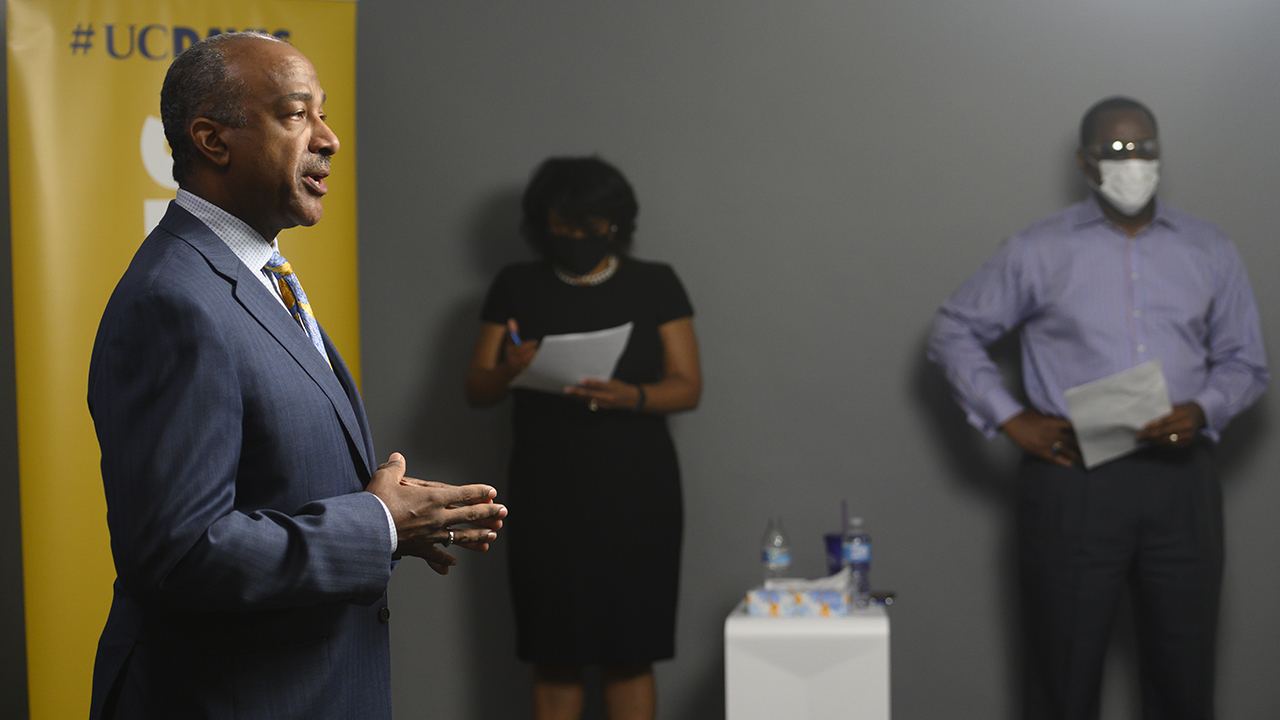
Diversity, equity and inclusion
“To Boldly Go’s” Goal 3, embracing diversity, equity and inclusion, received a giant boost in February 2019 when the chancellor appointed Renetta Garrison Tull as the campus’s first vice chancellor in charge of the newly established Office of Diversity, Equity and Inclusion, in February 2019.
Tull took up her new post the following July, and less than a year later found herself with Chancellor May leading a UC Davis Moment of Silence in memory of George Floyd, Breonna Taylor, Ahmaud Arbery, Stephon Clark and other men and women whose deaths had driven people into the streets across the country to protest brutality by police and others against the Black community.
New relationships
Besides reinvigorating UC Davis’ relationship with the city of Sacramento, Chancellor May has done the same with Davis and Yolo County, in part by the three-way memorandum of understanding that called for UC Davis to build more on-campus student housing — something the university has done with projects that include The Green at West Village and the new Orchard Park apartment project (under construction).
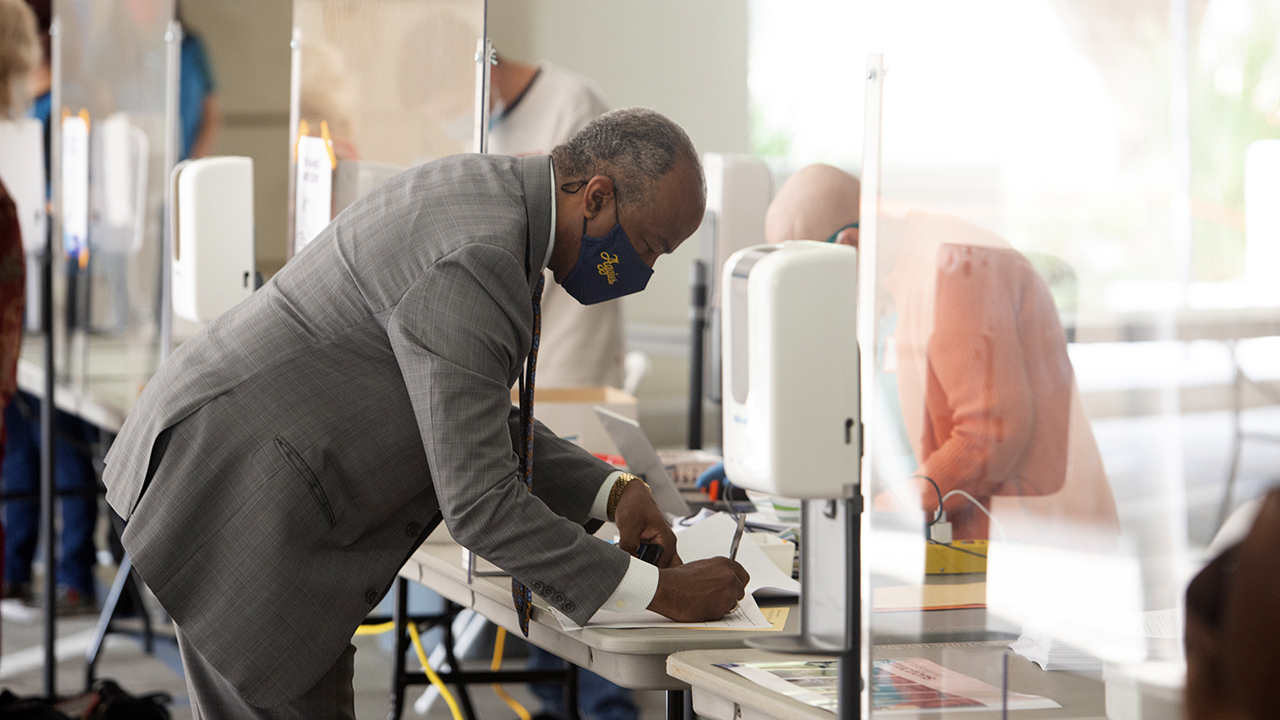
The campus, city and county also came “together” during the pandemic, through Healthy Davis Together and Healthy Yolo Together, preventing infections, hospitalizations and deaths.
Gloria Partida, who was elected to the Davis City Council in 2018 and who would serve as mayor from 2019 until just recently, said she could not have asked for a better partner than Chancellor May.
“We realized immediately that, because we are so interconnected, campus and city, that we could not run a COVID-19 prevention program on campus and not in the city,” she said. “Healthy Davis Together proved a success for us and a model for other college communities.”
It earned awards from the Association of Public and Land-Grant Universities and the International Town Gown Association. In regard to the latter, Partida’s successor as mayor, Lucas Frerichs, noted that the Davis-UC Davis town-gown relationship is so much more than Healthy Davis Together. “The city and campus have a relationship that is only growing stronger, and we look forward to all the collaboration that is to come.”
Frerichs added: “Congratulations to Chancellor May on his fifth anniversary of leading UC Davis.”
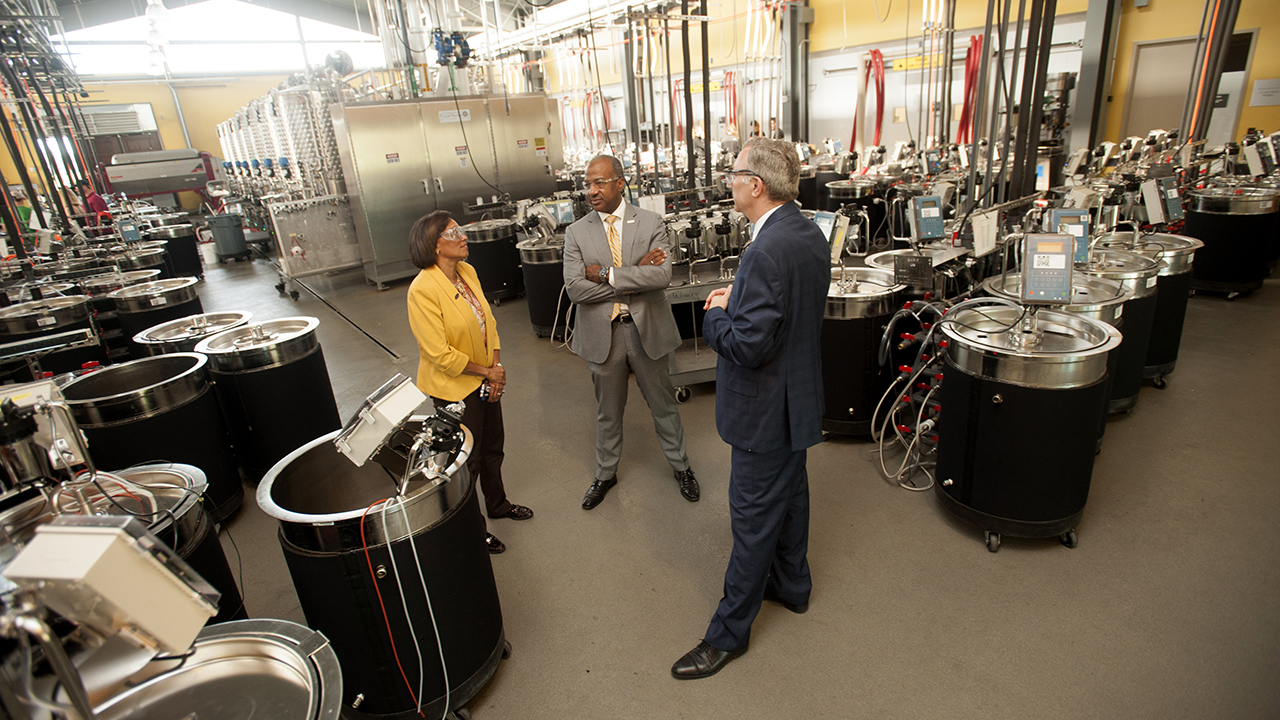
Still ‘boldly going’
UC Davis is also growing stronger: bringing in $1 billion in research funding for the first time, in 2021-22, and nearing the close of the $2 billion “Expect Greater. From UC Davis. For the world” campaign — a milestone achievement that Chancellor May aims to celebrate in the next year or so.
He remains focused on progress on every goal of “To Boldly Go.” For an improved educational experience, for example, measured in part by student success, he is fostering the new Aggie Launch program, designed to provide every UC Davis student with career counseling and experiential learning. He aims to minimize opportunity gaps and see every student gain employment or acceptance to graduate/professional school upon graduation.
Upward mobility is another hoped for outcome — and something for which UC Davis has earned top national rankings.
Over the next five years, Chancellor May is looking forward to UC Davis’ designation as a Hispanic Serving Institution, or HSI, under a federal program that would provide more scholarships and other opportunities for rising scholars, and the means to attract more Latinx faculty to the university.
And, of course, he is eager to see the opening of the first phase of Aggie Square December 2024, just over seven years after he became chancellor.
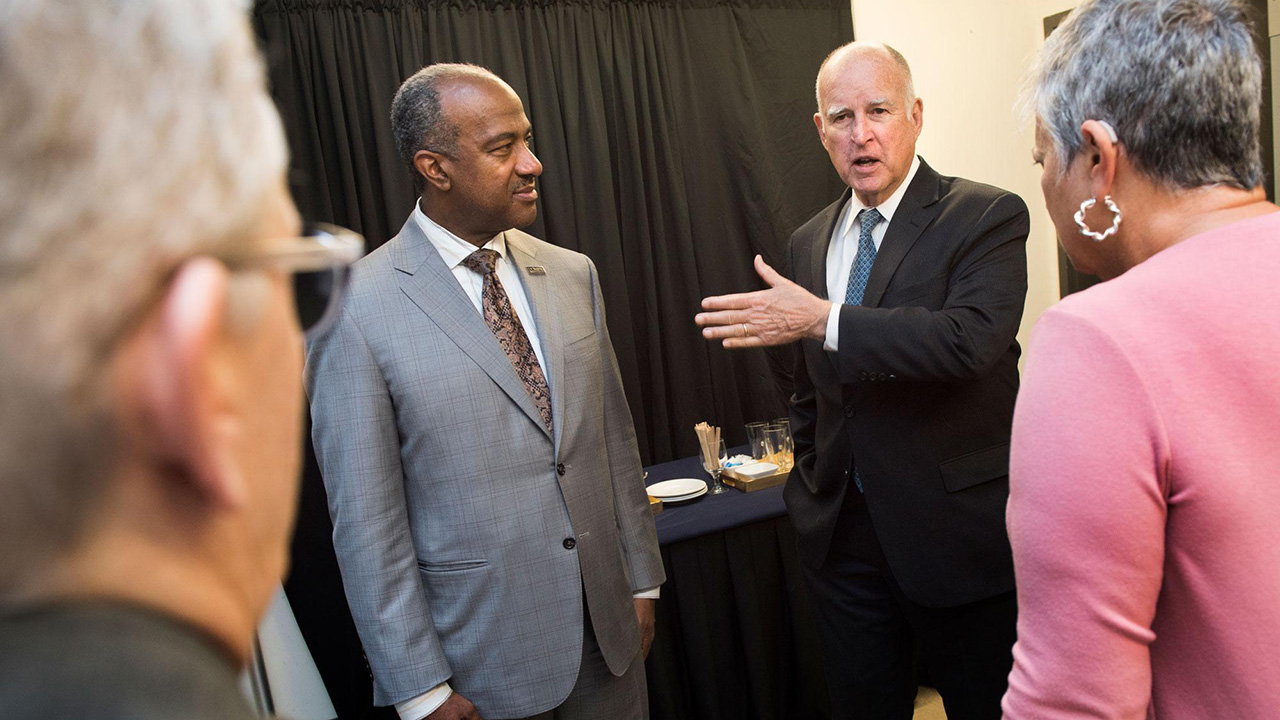
The chancellor’s stature continues to rise nationally and regionally. On June 1, he moved up to chair of the board of directors of the Association of Public and Land-Grant Universities, or APLU, comprising 244 public research universities, land-grant institutions, state university systems and affiliated organizations; and a month later he became chair of the board of directors of the Big West athletic conference, which counts a majority of UC Davis teams as members.
All of this, plus achievements in research, are pushing UC Davis’ profile to new heights — something Chancellor May had hoped for when he first joined UC Davis.
“If you’re not in higher ed and you’re from east of the Rockies, you probably have not heard much about UC Davis,” he said in an interview with Dateline UC Davis his first day on the job. UC Davis is certainly well known in academia, he added, but there’s room to improve, particularly in the East, say, when parents sit down with their teenagers to discuss college options.
“UC Davis should come up in the conversation,” he said then.
Today, it most assuredly does.